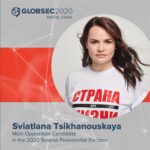The European Parliament (EP) has selected Belarus’ opposition movement as the winners of this year’s Sakharov Prize for Freedom of Thought.
EP President David Sassoli (below) recognized an “initiative of brave women” in his speech, including opposition leader Svetlana Tikhanovskaya, Nobel Laureate Svetlana Alexievich, musician and political activist Maryia Kalesnikava, and political activists Volha Kavalkova and Veranika Tsapkala.
The award sends an important message, Belarusian opposition politician Valery Tsepkalo told DW.
“It means that Belarus’ people are not alone face to face with this dictatorial regime, that Belarus’ people feel the support from the side of the European community and from the side of the global community — that the whole world is actually watching what is happening in Belarus. And the whole world has support (for) Belarus’ democratic movement,” he said.
On a visit to Belarus, Russia’s foreign intelligence chief today reiterated Kremlin’s unsubstantiated claim that the pro-democracy protests are being fomented from abroad.

FPRI
Sergei Naryshkin, the director of Russia’s Foreign Intelligence Service, hailed a constitutional amendment process proposed by Lukashenko, saying that it would “give answers to many questions” while preserving stability in Belarus. The opposition has rejected the reform as an attempt by Lukashenko to buy time and remain in office while assuaging public anger, AP reports.
“Russia is offering a lifeline to Lukashenko,” said Alexander Klaskovsky, an independent analyst based in Minsk. “A vague constitutional reform is supposed to substitute the political agenda and help authorities to drown the protests in talks, but an exacerbation of the economic situation may trigger a new wave of discontent.”
The Belarusian protests are still far from achieving all their aims, but they have already made history, analyst Sławomir Sierakowski of Krytyka Polityczna (Political Critique) writes for The New York Review of Books.

Globsec
Forty years after the emergence of Poland’s Solidarity movement, Belarus has its own August, adds Sierakowski, author of a compelling eyewitness account of the Belarusian social revolution in the latest issue of the Journal of Democracy.
The European Parliament established the 50,000 euro ($60,000) prize in 1988 in honor of Soviet dissident physicist Andrei Sakharov and to recognize individuals and organizations promoting human rights and fundamental freedoms.
MEPs today adopted a report on EU relations with Belarus by strongly backing the European Council’s decision not to recognize the results of fraudulent presidential elections and to impose restrictive measures against 40 individuals identified as responsible for repression and intimidation against peaceful demonstrators, Renew Europe reports.
How should democratic countries address the charges of election fraud in Belarus? The Wilson Center’s Canada Institute, Global Europe Program, and Kennan Institute invite you to a virtual panel with leading authorities – Radosław Sikorski, Christopher Sands, Kenneth S. Yalowitz and Joel Sokolsky – on Friday, October 23, 9:00-10:00am EST to discuss international responses to the crisis in Belarus. RSVP
It is an honour to announce that the women and men of the democratic opposition in #Belarus are the 2020 #SakharovPrize laureates.
They have on their side something that brute force can never defeat: the truth.
Do not give up on your fight. We are by your side. pic.twitter.com/o6Xm4WYVKi
— David Sassoli (@EP_President) October 22, 2020







